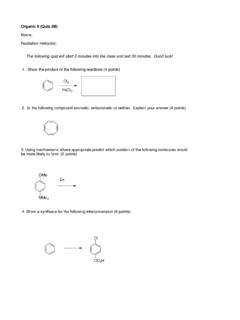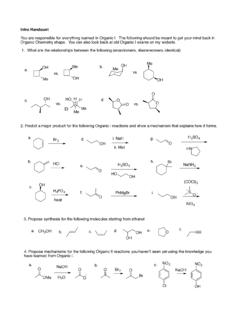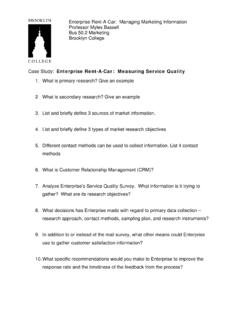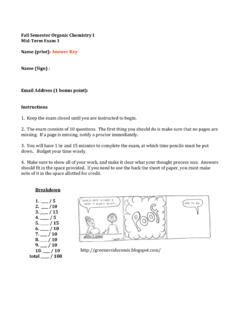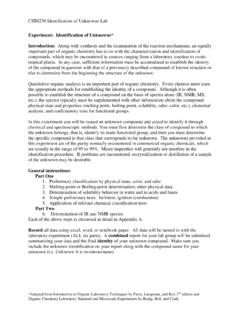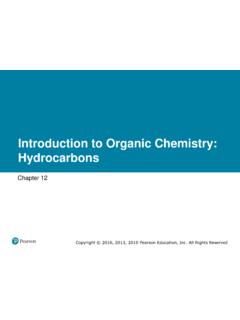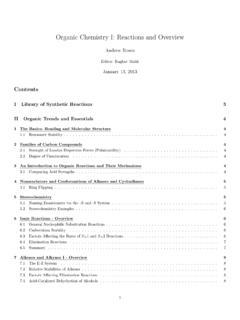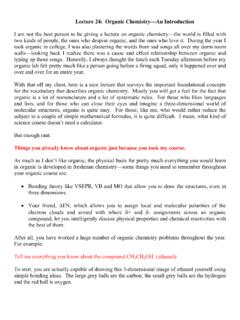Transcription of Organic Chemistry II Syllabus (F2018)
1 Organic Chemistry II Chemistry 3521 Fall 2018 Mondays and Wednesdays, 9:30-10:45, Rm2310 Ingersoll Instructor: Prof. Ryan Murelli Email (preferred contact method): Phone: (718)-951-5000 (ext. 2821). email me if I do not answer. I don't check voicemail on my office phone. Website: Office Hours: Mondays and Wednesdays 11-1, 437 Ingersoll Extension Course Description: Organic Chemistry is a required class for so many related fields of study because it requires a student to: 1) think about structures in 3-dimensions, and 2) analyze data using his/her understanding of basic principles to solve a problem. Think about it: the skills you use to propose a structure for an unknown compound from a set of 1H NMR peaks are the same skills you will use to diagnose a patient with an unknown illness from a set of symptoms. This course, in conjunction with Chemistry 3511, will provide students with an introduction to Organic Chemistry concepts. Specifically, this course will cover Organic reactions, mechanisms and principles that are relevant to many other sciences and that provide us with a greater understanding of how the natural world works.
2 The prerequisite for this course is Chemistry 51 or Chemistry 3510 or Chemistry 3511 and 3512; Chemistry 3522 is a prerequisite or corequisite. Course Objectives: Upon completion of the course, students should be able to: - Explain and/or apply selected fundamental principles of Organic Chemistry - Provide reactants, reaction conditions, or reaction products for certain key reactions - Illustrate the mechanism of certain key reactions Required Texts and Materials Brown, Foote, Iverson, and Anslyl, Organic Chemistry . 6th ed. BElmost, CA: Brooks/Cole Cengage Learning, 2009. (Other additions are fine as are other books that are meant for undergraduate Organic Chemistry I and II. Just pay attention to the material we cover in class and make sure that it matches what you are reading) Recommended Texts and Materials. Molecular Model Set for Organic Chemistry , Prentice Hall Course Evaluation: Recitation Attendance: 5% Quiz Grade: 20% (Average of top 4 quizzes)* Lecture Exams: 40% (20% each)** Final Exam: 35%** *Missed Quizzes: The reason that I drop a quiz is because I recognize that you all have lives outside of school and most students will miss at least one quiz due to traffic, construction on the Q line, maybe on the Q line, family emergency or crisis, or alien abduction.
3 Scheduling make-ups is not feasible in such a large group while still maintaining fairness to the overall process. Thus, there are NO MAKE-UP QUIZZES with two exceptions: 1. If you know or suspect that you might miss a quiz in advance for a religious holiday, family commitment, or pretty much any reason besides I want more time to study , you can schedule to take the quiz in a difference recitation section. In this instance, the responsibility is on you to identify the alternative recitation sections that would work and email them (CC'ing myself and your recitation instructor) asking if they can accommodate you. This must be done 48 hours prior to the first quiz of that series of quizzes, but it is highly recommended that you schedule it ASAP since there is a possibility you may have to ask multiple instructors if they have space for you. 2. If you miss more then one quiz with reasonable excuses, please let me know after you miss the 2nd and if I view them as reasonable I will work with you to make sure that a zero is not counted towards your quiz average, and this may involve a makeup quiz.
4 ** Missed MidTerm Exams: No makeups will be given for the midterms. If you miss one oof the two midterms with a valid excuse, your grade will be weighted based on your completed assignments as I see fit based upon the circumstances. Without an excuse, you will get a 0. Hopefully no one will miss both midterms. ** Missed Final Exams: In the event of an excused absence from the final exam, you will need to take a makeup exam during an assigned time set by the Chemistry department the following semester. Please talk with Prof. Murelli for details if you miss the final. Assigning Letter Grades for Exams and for the Course: I do not have a formal curve for the course. Quiz averages are more in line with standard numerical/letter grade systems (ie, 90-100 = ~A, 80-90 +~B, etc.), but exams are typically lower (ie, 85-100 = ~A, 70-85 = ~B, 55-70 = ~C). I will provide an approximate letter grade breakdown after each exam. Policy for Regrades: Re-grade requests must be made within 2 weeks of the quiz or exam, and must be done through filling out and submitting a re-grade request form.
5 Re-grade request forms can be found online, and should be filled out and turned into the Chemistry office (ask the office staff to put it in my mailbox). Any request that is deemed an egregious error on our part (ie, adding mistake, 100% correct answer marked wrong), PLEASE let us know and we will correct it. However, any more subjective re-grade request (ie, my friend got 5/8 and I got 4/8, or I got 0/5 on this question and think I deserve something), the entire exam or quiz will be re-graded. This policy is not meant to quash those with legitimate questions about their grades, but rather deter abuse of the re-grade request system. University Policy of Academic Integrity: The faculty and administration of Brooklyn College support an environment free from cheating and plagiarism. Each student is responsible for being aware of what constitutes cheating and plagiarism and for avoiding both. The complete text of the CUNY Academic Integrity Policy and the Brooklyn College procedure for implementing that policy can be found at this site: If a faculty member suspects a violation of academic integrity and, upon investigation, confirms that violation, or if the student admits the violation, the faculty member MUST report the violation.
6 Tentative Schedule Topic Tentative Dates Reading and Practice Problems (6th Edition) Organic I Refresher 8/27, 8/29 You need to know the reactions of the following chapters Acid/Base (Chapter ) Substitution and Elimination (Chapter 9) Reactions of Alkenes/Alkynes (Chapter 6 and 7) For practice, see: Organic I Recitation Handouts 3, 4 and 6 Reactions of Alcohols 9/5, 9/12 Chapter 10. Q. , , , , , , , , Quiz 1 9/17-9/21 Topics: Organic I reaction refresher and alcohols Q1. Name the reactants, reagents and/or products of the Organic I or alcohol reactions (4 questions, 10 points) Q2. Show the mechanism of the following Organic I or alcohol reactions (2 questions, 10 points) Ethers, Epoxides and 9/17 Chapter 11. Sulfides Q. , , , , , , Aldehydes and 9/24, 9/26 Chapter 16. Ketones Q. , , , , , , , , , , , Quiz 2 10/1-10/5 Topics: Ethers/Epoxides/Sulfides/Aldehydes/Keton es Q1. Name the reactants, reagents and/or products of the Ethers/Epoxides/Sulfides/Aldehydes/Keton es, plus one reaction from Organic I/alcohols (4 questions, 10 points) Q2.
7 Show how you would complete the following synthesis (2 questions, 10 points) Carboxylic Acids and 10/1, 10/3 Chapters 17 and 18. Derivatives Q. , , , , , , , , , , , , Exam 1 10/10 All material through Carboxylic Acids and Derivatives ~30% on Reactions ~20% on Mechanisms ~20% on Synthesis ~20% More General Concept Questions ~10% Grand Challenge' Enolates and 10/15 Chapter 19. Enamines , , , , , , , , , , , , , Conjugation and 10/17 Chapter 20 ( ), Chapter 21( ) Aromaticity Q. , , , , , , , , Quiz 3 10/22-10/26 Enolates, Enamines, Conjugation and Aromaticity Q1. Identifying Aromatic/Non-Aromatic/Anti-Aromatic (8 points) Q2. Mechanism Questions (6 points) Q3. Synthesis Questions (6 points) Reactions of Benzene 10/22, 10/24 Chapter 21 , , , , , Pericyclic Reactions 10/29, 10/31, Chapter 20 11/5 Q. , , , , Quiz 4 11/5-11/9 Topics: Aromaticity, Reactions of Benzene and Pericyclic Reactions Q1. Know your reactions/reagents (8 points) Q2.
8 Mechanisms-related questions (6 points) Q4. Understanding/predicting stereochemistry of pericyclic reactions (6 points) Amines 11/7, 11/12 Chapter 23 Q. , , , , , , , , , C-C Bond Formation 11/14, 11/19 Chapter 24 Q. , , , , , , , Exam 2 Review 11/21 Exam 2 11/26 Cumulative back through Organic I, but with emphasis on reactions since Exam 1. ~30% on Reactions ~30% on Mechanisms ~10% on Synthesis ~10% on Stereochemistry of Pericyclic Reactions ~10% More General Concept Questions ~10% Grand Challenge' Amino Acids and 11/28 Chapter 27 Peptides Also read: Q , , , Carbohydrates 12/3 Chapter 25 Also watch following: Q. , , Lipids 12/5 Chapter 26 Q. , , , , , Polymers 12/10 Chapter 29 Q. , , , , Quiz 5 12/3-12/7 Topics: Amino Acids/Peptides and Carbohydrates Q1. Questions on Peptide Synthesis (6 points) Q2. Fisher Projections, Chairs and Sugars (6 points) Q3. Open-Ended Concept Question (8 points) Final Exam Review 12/12
